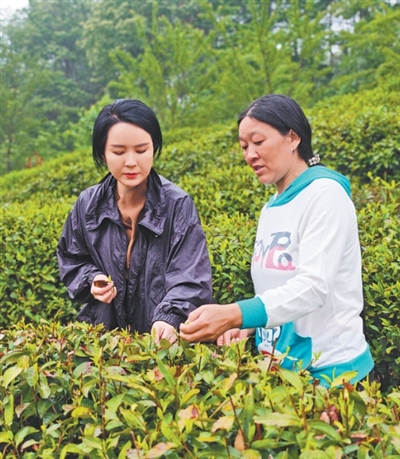




- BRNN
- BRI News
- BRNN News
- Database
Official Documents Polices and Regulations
Inter-government Documents International Cooperation BRI Countries
Business Guide Economic Data BRI Data
Trade
Investment Projects Latest projects
Cases - Content Pool
After graduating from college, Wan Qinqi launched her first business in Xi'an, the capital of northwest China's Shaanxi Province.
In 2007, she returned to her hometown — Guangfo town, Pingli county, Ankang city, Shaanxi Province — to help develop industries including edible fungus, vegetables and tea.
Over nearly two decades, she has created employment for more than 400 people, provided entrepreneurship training for over 1,500 individuals and offered vocational training to more than 6,000 people. As a result, she has won multiple provincial and national honors.

Wan Qinqi (L) and a tea farmer check the growth of tea leaves in Guangfo town, Pingli county, Ankang city, northwest China's Shaanxi Province. (Photo/Wu Yongjie)
Wang Guilin and her husband have worked at Wan's company for more than 10 years. When the company was established in 2008, Wang was a housewife who became one of the first workers to clean sticks of black fungi at the company. Years later, she rose to become head of the company's logistics department.
The company has established an industrial base covering nearly 1,000 mu (66.67 hectares) and built standardized production and processing facilities spanning almost 5,000 square meters, supporting more than 500 farming and breeding households.
Wan's efforts gradually gained recognition and support. The company was designated a provincial-level demonstration zone for returning entrepreneurs in 2019, receiving a one-time reward of 1 million yuan ($139,000). It also enjoyed a two-year interest subsidy policy for a guaranteed loan worth 3 million yuan in 2022.
In early 2010, Wan became a certified tea artist. Two years later, while standing in the courtyard of an abandoned vocational school in the town, she was captivated by 30 mu of old tea trees behind the school and immediately decided to purchase the courtyard and enter the tea industry.
In 2015, Ankang city created a platform for returning entrepreneurs to exchange ideas, using its business incubation base and demonstration zone to promote entrepreneurship and employment. Through a program supporting 1,000 college student entrepreneurs, Wan established a skills training academy in the Ankang High-Tech Industrial Development Zone, focusing on practical technology and industrial skills training for farmers.
Since its establishment, the academy has held over 100 training sessions for over 1,500 people, empowering many rural women with valuable skills.
"My tea garden originally covered just over 100 mu. I then developed an additional 200 mu, creating terraced tea gardens and introducing several new tea varieties," Wan said.
On a recent day, more than 30 students from a farmers' school founded by Wan gathered in the lush, terraced tea garden to learn skills from agricultural experts.
"This school was established under the guidance of Ankang's Bureau of Agriculture and Rural Affairs," Wan said. "Utility bills are waived, and more importantly, we have teaching support. Both Professor Yu Youben from Northwest A&F University and Professor Ye Yang from the Tea Research Institute of the Chinese Academy of Agricultural Sciences have taught here."
When farmers struggled with slow sales of their agricultural products, Wan helped them promote and sell their goods on e-commerce platforms at no cost, leading her team to create what she calls an "e-commerce highway for helping farmers."
Xiong Shaocui from Bajiaomiao village is one such beneficiary. Once troubled by unsold agricultural products, she now sells her homemade cured pork and dried bamboo shoots through e-commerce platforms with Wan's help, with annual sales exceeding 60,000 yuan.
"My hometown keeps getting better, and my motivation grows stronger," Wan said.

Tel:86-10-65363107, 86-10-65368220, 86-10-65363106